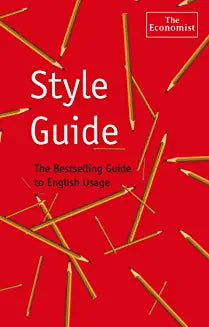The Economist Style Guide
The Economist Style Guide
Preço normal
€23,13 EUR
Preço normal
Preço de saldo
€23,13 EUR
Preço unitário
por
Imposto incluído.
Envio calculado na finalização da compra.
Não foi possível carregar a disponibilidade de recolha
Titulo: The Economist Style Guide
Autor: The Economist
ESTADO: NOVO
ISBN/EAN: 9781861979162
Editor: The Economist
Ano: 2005
Idioma: Inglês
Encadernação: N.A.
Páginas: 256
Coleção: N.A.
Nº. da Coleção: N.A.
Código de Controlo: 6D
Descrição: The best-selling guide to English usage. This new, expanded ninth edition of the best-selling guide to style is based on The Economist's own house style manual, and is an invaluable companion for everyone who wants to communicate with the clarity, style and precision for which The Economist is renowned. As the introduction says, 'clarity of writing usually follows clarity of thought.' THE STYLE GUIDE gives general advice on writing, points out common errors and cliches, offers guidance on consistent use of punctuation, abbreviations and capital letters, and contains an exhaustive range of reference material - covering everything from accountancy ratios and stock market indices to laws of nature and science. Some of the numerous useful rules and common mistakes pointed out in the guide include: * Which informs, that defines. This is the house that Jack built. But This house, which Jack built, is now falling down. * Discreet means circumspect or prudent; discrete means separate or distinct.Remember that "Questions are never indiscreet. Answers sometimes are" (Oscar Wilde). * Fortuitous means accidental, not fortunate or well-timed.
Ver detalhes completos
Autor: The Economist
ESTADO: NOVO
ISBN/EAN: 9781861979162
Editor: The Economist
Ano: 2005
Idioma: Inglês
Encadernação: N.A.
Páginas: 256
Coleção: N.A.
Nº. da Coleção: N.A.
Código de Controlo: 6D
Descrição: The best-selling guide to English usage. This new, expanded ninth edition of the best-selling guide to style is based on The Economist's own house style manual, and is an invaluable companion for everyone who wants to communicate with the clarity, style and precision for which The Economist is renowned. As the introduction says, 'clarity of writing usually follows clarity of thought.' THE STYLE GUIDE gives general advice on writing, points out common errors and cliches, offers guidance on consistent use of punctuation, abbreviations and capital letters, and contains an exhaustive range of reference material - covering everything from accountancy ratios and stock market indices to laws of nature and science. Some of the numerous useful rules and common mistakes pointed out in the guide include: * Which informs, that defines. This is the house that Jack built. But This house, which Jack built, is now falling down. * Discreet means circumspect or prudent; discrete means separate or distinct.Remember that "Questions are never indiscreet. Answers sometimes are" (Oscar Wilde). * Fortuitous means accidental, not fortunate or well-timed.


